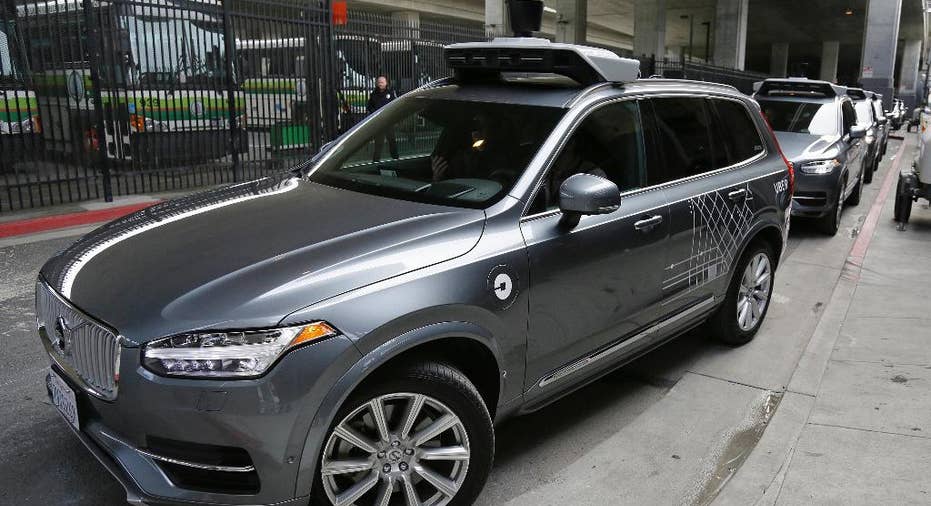California, Uber in Legal Showdown Over Self-Driving Cars

SAN FRANCISCO – Uber is riding its self-driving cars into a legal showdown with California regulators.
The ride-hailing company is refusing to obey demands by the state's Department of Motor Vehicles that it immediately stop picking up San Francisco passengers in self-driving cars.
Hours after Uber launched a self-driving service Wednesday morning with a handful of Volvo luxury SUVs, the DMV sent the company a letter saying the move was illegal because the cars did not have a special permit the department requires for putting autonomous vehicles on public roads.
As of Wednesday night, the Volvos — distinctive in look with sensors protruding from their tops — were still roaming San Francisco's streets. The company did not respond to a request for comment about the state's legal threat.
"If Uber does not confirm immediately that it will stop its launch and seek a testing permit, DMV will initiate legal action," DMV Chief Counsel Brian Soublet wrote the company. He referenced the possibility of taking Uber to court.
Uber knew about the DMV's permit requirement but argues that its cars do not meet the state's definition of an "autonomous vehicle" because they need a person behind the wheel to monitor and intervene if needed.
Parsing the definition of an autonomous vehicle is in line with Uber's history of testing legal boundaries. During its meteoric rise into a multibillion dollar company, Uber has argued with authorities in California and around the world about issues including driver criminal background checks and whether those drivers should be treated as contractors ineligible for employee benefits.
As the two sides planned to meet Thursday, both seemed dug into opposing positions.
The argument centers around whether the cars — tricked out with sensors so they can steer, accelerate and brake, and even decide to change lanes — are, legally speaking, "autonomous vehicles."
The company argues that its cars aren't covered by the permit requirement, which says an "autonomous vehicle" requires a permit if it can drive itself "without the active physical control or monitoring of a natural person."
According to Anthony Levandowski, the leader of Uber's self-driving program, Uber's cars aren't advanced enough to drive themselves without human monitoring. Therefore, he said, the Volvos are not autonomous — and do not require a permit.
California has issued permits to 20 companies for tests of autonomous vehicles on public roads, mostly traditional automakers and tech companies.
Getting a permit for prototype testing is part of legal language negotiated between the state and industry, and DMV lawyer Soublet argued in an interview that the permit process helps maintain public confidence that the technology is safe.
"Don't start doing this stuff. Apply for the permit. Follow the rules," Soublet said of Uber.
To receive a permit, a company must show proof of insurance, pay a $150 fee and agree that a human driver can take control of the vehicle.
Operating without a permit arguably gives Uber a competitive advantage. Companies with one must report to the state all crashes and every instance in which a person takes control during testing. All that information is public.
Uber is sending another message to California: Other places want us if you don't.
In a blog post Tuesday, Levandowski warned that "complex rules and requirements could have the unintended consequence of slowing innovation" and named several places outside California he characterized as being "pro technology."
The launch in San Francisco, the city where Uber is headquartered, expanded a deployment of self-driving cars the company started in Pittsburgh in September. The testing lets everyday people experience the cars as Uber works to identify glitches before expanding the technology's use in San Francisco and elsewhere. The company wouldn't say the exact number of cars, calling it a "handful."
The cars have an Uber employee behind the wheel to take over should the technology fail. Users of the app may be matched with a self-driving car but can opt out if they prefer a human driver. Self-driven rides cost the same as ordinary ones.
Uber's fleet of Volvo XC90s aren't the first self-driving cars on San Francisco streets — several other companies visit regularly with test prototypes, though none offers public rides.
Once testing is complete, the ultimate vision is to sell to the public technology that supporters argue will save thousands of lives because it doesn't drink, text, fall asleep or take dangerous risks.
___
Pritchard reported from Los Angeles. Contact him at https://twitter.com/lalanewsman. Liedtke can be reached at https://twitter.com/liedtkesfc



















